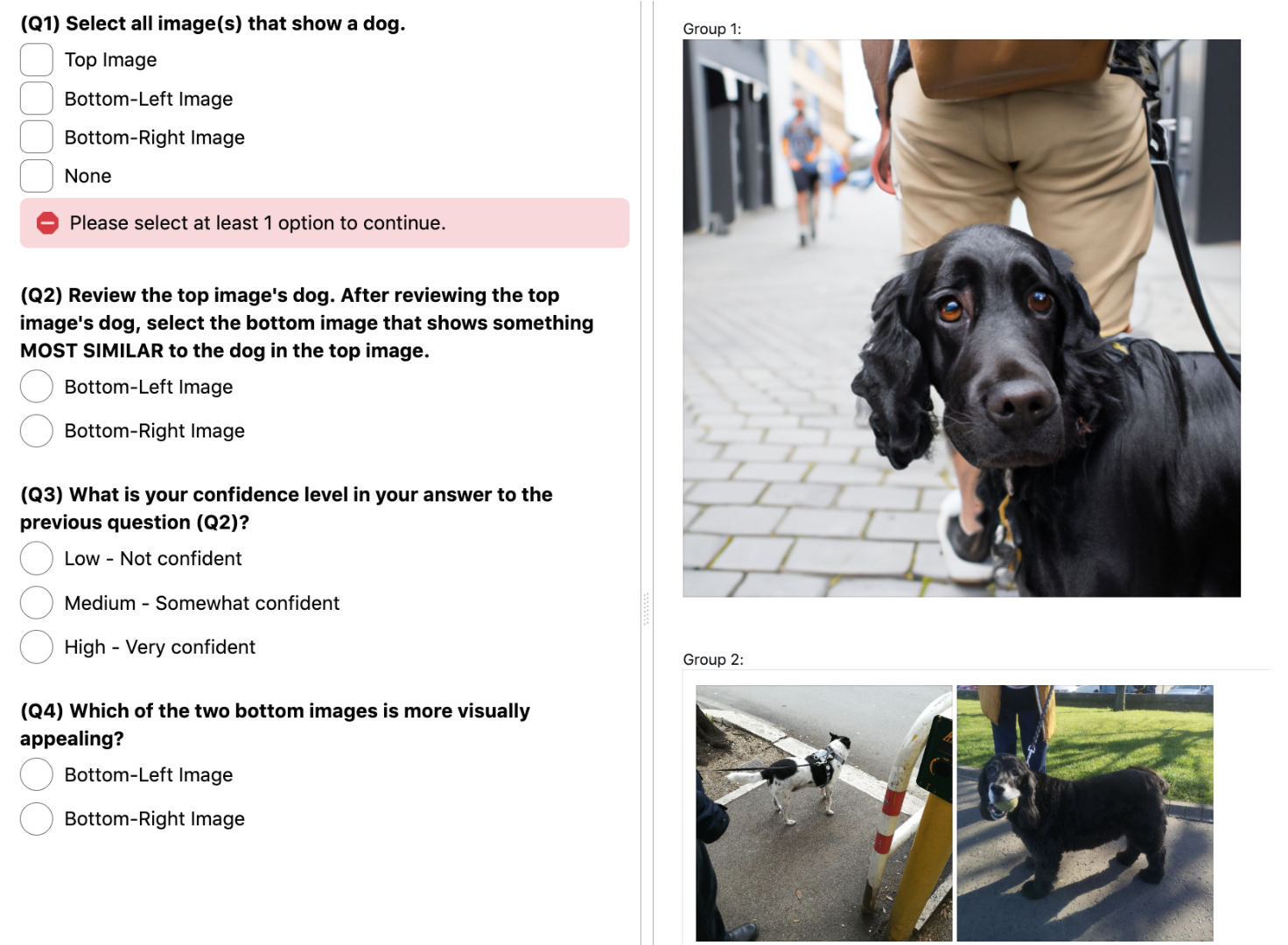Classification for everyone : Building geography agnostic models for fairer recognition
2312.02957

0
0

Abstract
In this paper, we analyze different methods to mitigate inherent geographical biases present in state of the art image classification models. We first quantitatively present this bias in two datasets - The Dollar Street Dataset and ImageNet, using images with location information. We then present different methods which can be employed to reduce this bias. Finally, we analyze the effectiveness of the different techniques on making these models more robust to geographical locations of the images.
Get summaries of the top AI research delivered straight to your inbox:
Overview
- The paper introduces a novel approach to building geography-agnostic classification models that can be used more fairly across diverse populations.
- The researchers developed techniques to train models that are less reliant on location-specific features, enabling more equitable recognition performance.
- Key innovations include methods for data augmentation and model architecture design to promote geographical generalization.
- Experiments on several benchmark datasets demonstrate the effectiveness of the proposed approach in enhancing fairness across regions.
Plain English Explanation
The paper tackles an important issue in machine learning - the challenge of building classification models that work well across different geographical regions or populations. Many AI systems today tend to perform better in certain locations or on data from specific demographics, leading to unfair outcomes.
The researchers present a new way to train classification models that are less dependent on location-specific features. Rather than learning to rely on cues tied to particular regions, the models are encouraged to focus on more universal patterns that generalize better. This is achieved through specialized data augmentation techniques and architectural choices that promote geographical generalization.
Essentially, the goal is to create AI classifiers that don't exhibit strong biases towards certain locations, allowing them to recognize relevant patterns more fairly and accurately across diverse contexts. This could have significant implications for applications like facial recognition, content moderation, and beyond, making these technologies more accessible and equitable for all users.
Technical Explanation
The paper proposes a framework for building "geography-agnostic" classification models. The key innovations include:
Data Augmentation: The researchers developed new data augmentation techniques that introduce geographical shifts, such as translating images or modifying GPS coordinates. This forces the model to learn features that are robust to location-specific biases.
Model Architecture: The model architecture incorporates specialized components, like a geography-aware feature extractor, to disentangle location-dependent and location-independent representations. This helps the model focus on universal patterns rather than overfitting to regional cues.
Evaluation Protocols: The authors designed evaluation protocols to assess the geographical generalization capabilities of the trained models. This includes testing on held-out regions as well as cross-country and cross-continent generalization benchmarks.
Experiments on several image classification datasets demonstrate the effectiveness of the proposed approach. The geography-agnostic models achieve comparable or better performance than traditional approaches, while exhibiting substantially improved fairness across different geographical regions.
Critical Analysis
The paper makes a valuable contribution to the important problem of building more geographically equitable AI systems. The proposed techniques for data augmentation and model architecture design are innovative and well-grounded in the challenges of geographical bias.
However, the paper does not explore the impact of other demographic factors beyond geography, such as ethnicity, socioeconomic status, or gender. It would be important to extend the evaluation to assess fairness across these additional dimensions as well.
Additionally, the paper focuses on image classification tasks, but the ideas could potentially be applied to other domains like natural language processing or speech recognition. Exploring the generalizability of the approach to a wider range of applications would be an interesting direction for future research.
Finally, while the experimental results are promising, it would be helpful to understand the computational and resource requirements of the proposed methods, as well as their scalability to large-scale, real-world deployments.
Conclusion
This paper presents a compelling approach to addressing the challenge of geographical bias in machine learning models. By developing techniques to train classification systems that are less reliant on location-specific features, the researchers have made an important step towards building more fair and inclusive AI technologies.
The innovations in data augmentation and model architecture design demonstrate the potential to create AI systems that recognize relevant patterns equitably across diverse populations and contexts. As AI becomes increasingly ubiquitous, this work highlights the critical need to prioritize fairness and accessibility in model development, paving the way for a more just and inclusive AI-powered future.
This summary was produced with help from an AI and may contain inaccuracies - check out the links to read the original source documents!
Related Papers

Regional biases in image geolocation estimation: a case study with the SenseCity Africa dataset
Ximena Salgado Uribe, Mart'i Bosch, J'er^ome Chenal

0
0
Advances in Artificial Intelligence are challenged by the biases rooted in the datasets used to train the models. In image geolocation estimation, models are mostly trained using data from specific geographic regions, notably the Western world, and as a result, they may struggle to comprehend the complexities of underrepresented regions. To assess this issue, we apply a state-of-the-art image geolocation estimation model (ISNs) to a crowd-sourced dataset of geolocated images from the African continent (SCA100), and then explore the regional and socioeconomic biases underlying the model's predictions. Our findings show that the ISNs model tends to over-predict image locations in high-income countries of the Western world, which is consistent with the geographic distribution of its training data, i.e., the IM2GPS3k dataset. Accordingly, when compared to the IM2GPS3k benchmark, the accuracy of the ISNs model notably decreases at all scales. Additionally, we cluster images of the SCA100 dataset based on how accurately they are predicted by the ISNs model and show the model's difficulties in correctly predicting the locations of images in low income regions, especially in Sub-Saharan Africa. Therefore, our results suggest that using IM2GPS3k as a training set and benchmark for image geolocation estimation and other computer vision models overlooks its potential application in the African context.
4/4/2024
📊
Mitigating Bias Using Model-Agnostic Data Attribution
Sander De Coninck, Wei-Cheng Wang, Sam Leroux, Pieter Simoens

0
0
Mitigating bias in machine learning models is a critical endeavor for ensuring fairness and equity. In this paper, we propose a novel approach to address bias by leveraging pixel image attributions to identify and regularize regions of images containing significant information about bias attributes. Our method utilizes a model-agnostic approach to extract pixel attributions by employing a convolutional neural network (CNN) classifier trained on small image patches. By training the classifier to predict a property of the entire image using only a single patch, we achieve region-based attributions that provide insights into the distribution of important information across the image. We propose utilizing these attributions to introduce targeted noise into datasets with confounding attributes that bias the data, thereby constraining neural networks from learning these biases and emphasizing the primary attributes. Our approach demonstrates its efficacy in enabling the training of unbiased classifiers on heavily biased datasets.
5/9/2024
💬
Evaluation of Geographical Distortions in Language Models: A Crucial Step Towards Equitable Representations
R'emy Decoupes, Roberto Interdonato, Mathieu Roche, Maguelonne Teisseire, Sarah Valentin

0
0
Language models now constitute essential tools for improving efficiency for many professional tasks such as writing, coding, or learning. For this reason, it is imperative to identify inherent biases. In the field of Natural Language Processing, five sources of bias are well-identified: data, annotation, representation, models, and research design. This study focuses on biases related to geographical knowledge. We explore the connection between geography and language models by highlighting their tendency to misrepresent spatial information, thus leading to distortions in the representation of geographical distances. This study introduces four indicators to assess these distortions, by comparing geographical and semantic distances. Experiments are conducted from these four indicators with ten widely used language models. Results underscore the critical necessity of inspecting and rectifying spatial biases in language models to ensure accurate and equitable representations.
4/29/2024

Towards Geographic Inclusion in the Evaluation of Text-to-Image Models
Melissa Hall, Samuel J. Bell, Candace Ross, Adina Williams, Michal Drozdzal, Adriana Romero Soriano

0
0
Rapid progress in text-to-image generative models coupled with their deployment for visual content creation has magnified the importance of thoroughly evaluating their performance and identifying potential biases. In pursuit of models that generate images that are realistic, diverse, visually appealing, and consistent with the given prompt, researchers and practitioners often turn to automated metrics to facilitate scalable and cost-effective performance profiling. However, commonly-used metrics often fail to account for the full diversity of human preference; often even in-depth human evaluations face challenges with subjectivity, especially as interpretations of evaluation criteria vary across regions and cultures. In this work, we conduct a large, cross-cultural study to study how much annotators in Africa, Europe, and Southeast Asia vary in their perception of geographic representation, visual appeal, and consistency in real and generated images from state-of-the art public APIs. We collect over 65,000 image annotations and 20 survey responses. We contrast human annotations with common automated metrics, finding that human preferences vary notably across geographic location and that current metrics do not fully account for this diversity. For example, annotators in different locations often disagree on whether exaggerated, stereotypical depictions of a region are considered geographically representative. In addition, the utility of automatic evaluations is dependent on assumptions about their set-up, such as the alignment of feature extractors with human perception of object similarity or the definition of appeal captured in reference datasets used to ground evaluations. We recommend steps for improved automatic and human evaluations.
5/8/2024